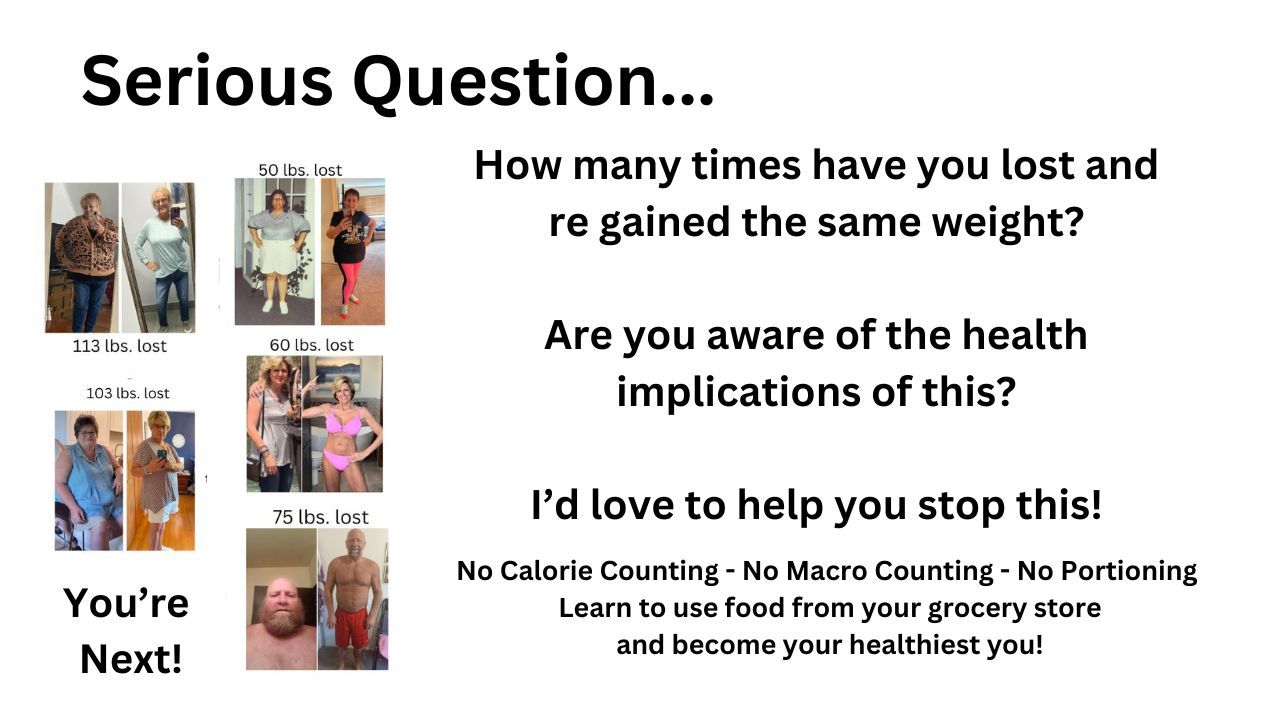
Dangers of Yo Yo Dieting
Nov 28, 2023The average person I talk to has tried 3 to 7 weight loss programs. We don't have to struggle like this. But here is the kicker: this touches on how dangerous losing and regaining weight is. Lets get you to a place where you understand food, how it works, how your body works and why it matters.... and keep the weight off for good.
Losing and regaining body fat repeatedly, often referred to as "yo-yo dieting" or weight cycling, can have various effects on the body. While some people may experience weight fluctuations naturally throughout their lives, frequent and intentional weight cycling can have both short-term and long-term consequences. Here's what happens inside our bodies when we engage in this pattern:
Short-Term Effects:
- Metabolic Changes: Frequent weight cycling can lead to metabolic changes. When you lose weight, your metabolism may slow down to conserve energy, making it harder to maintain weight loss. When you regain weight, your metabolism may not return to its previous baseline, leading to potential weight gain.
- Loss of Lean Muscle Mass: Rapid or extreme weight loss can lead to the loss of lean muscle mass along with fat. Muscle plays a crucial role in metabolism, so losing muscle can further slow down metabolic rate.
- Hormonal Fluctuations: Weight cycling can disrupt hormonal balance, particularly hormones related to hunger and appetite regulation. Leptin (which signals fullness) and ghrelin (which signals hunger) levels can be affected, potentially leading to increased appetite and cravings.
- Nutrient Deficiencies: Rapid weight loss diets may not provide all the necessary nutrients, leading to nutrient deficiencies. Repeated cycles of nutrient imbalances can impact overall health.
Long-Term Effects:
- Increased Risk of Chronic Diseases: Repeated weight cycling has been associated with an increased risk of chronic health conditions such as heart disease, diabetes, and hypertension.
- Psychological Impact: Yo-yo dieting can negatively affect mental health. Constantly losing and regaining weight can lead to frustration, anxiety, and poor body image.
- Reduced Metabolic Efficiency: Over time, the body may become less efficient at burning calories and storing energy, making it increasingly challenging to achieve and maintain weight loss.
- Loss of Trust in Hunger Signals: Frequent dieting can lead to a disconnect between the body's natural hunger and fullness cues. People may lose touch with their body's signals, making it difficult to eat intuitively.
- Impaired Muscle Health: Continuous weight cycling can lead to further loss of muscle mass, impacting physical strength and mobility.
- Potential for Weight Gain: Paradoxically, repeated weight cycling may contribute to long-term weight gain rather than weight loss. The body may become more efficient at storing fat in response to calorie restriction.
It's important to note that everyone's body responds differently to weight changes, and not everyone who engages in weight cycling will experience all of these effects. However, it is generally advisable to aim for sustainable, long-term changes in dietary and exercise habits to achieve and maintain a healthy weight. Crash diets and extreme weight loss strategies are often less effective in the long run and can have negative health consequences.
If you are considering weight loss or making changes to your diet and exercise routine, it's advisable to consult with a healthcare provider or a registered dietitian who can provide guidance on a safe and sustainable approach that aligns with your individual health goals.
Contact Marcy for a Free Nutrition Consultation
Don't miss a beat!
New moves, motivation, and classes delivered to your inbox.
We hate SPAM. We will never sell your information, for any reason.
